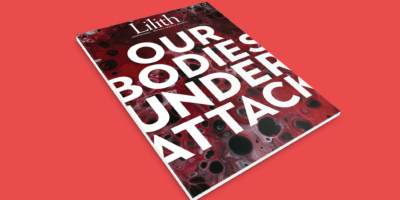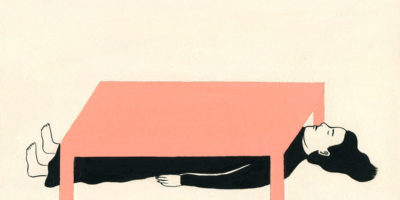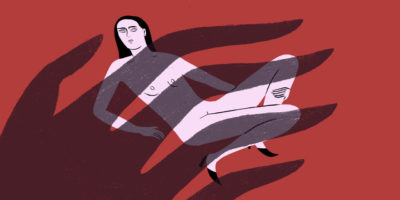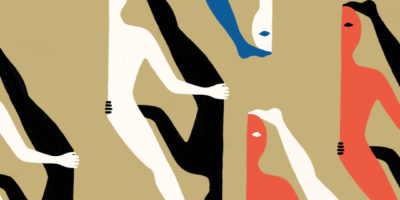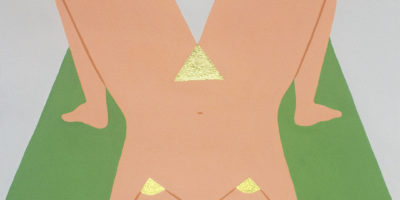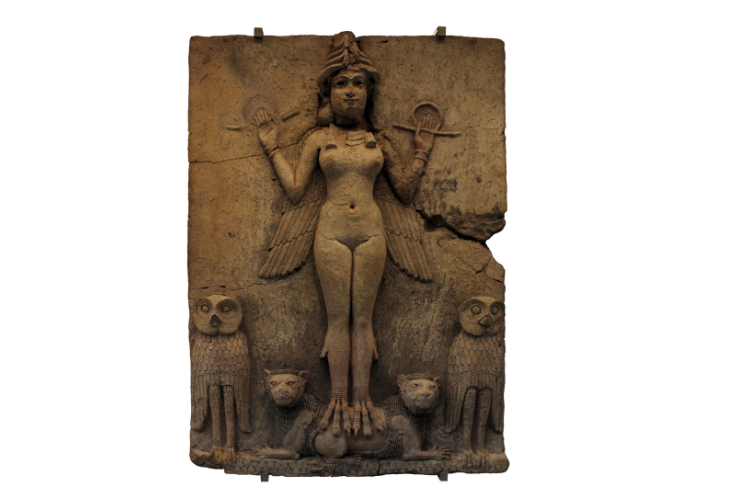
Fiction: Take Flight
The first sound Lily heard was her mother’s laughter. It preceded even her first cry. It was that laughter and not—as her mother would like to believe—the trip out of the womb that provoked this first frightened shriek. After years of the puffy fingers and exaggerated breasts of IVF, Ruth and Isaac had turned to prayer. Just a few weeks later, Ruth was pregnant, and the couple attributed it to Ruth’s strict adherence to the rabbi’s prescribed regimen.
The Rabbi had scrawled in Hebrew on a post-it note with the swift hand of a doctor writing a prescription, never once breaking eye contact. As he wrote, he
had said “Add the following line to your morning Amidah, and keep trying. If you haven’t conceived in three weeks’ time, come back and I will suggest something new.” As she left the synagogue, she had unfolded the Rabbi’s note. It read: may the God of mercy open my womb as he opened Hannah’s and Sarah’s and Rebecca’s before me. The Hebrew word for mercy is the same word as the plural of “womb.” Ruth had smiled at the Rabbi’s word play. She was to pray to a many-wombed God. And when the baby emerged with wings, Ruth took her cue from the matriarchal Sarah, and laughed.
Lily’s wings were small—handfuls of feathers protruding from stubborn shoulders. Ruth stroked the feathers with the tenderness of a farmhand toward a newborn calf, still giggling in awe. When Ruth had finished laughing, Isaac was gone. He had always thought of children as torch bearers for his DNA , and a winged thing wouldn’t do. He was sure there was some Talmudic source he could find to justify divorce on these grounds.
Though Ruth had intended to stop praying once it was no longer medically
necessary, the routine soon made a home for itself in the same obsessive part of her brain where she kept recipes and a catalogued list of everyone who had ever made her blush. Ruth made each possible blessing—if she saw a lovely flower, she recited the blessing for the beauty of nature, for a rainbow she referenced the covenant God made with Noah. Privately, she also prayed that Lily’s wingedness might resolve itself.
It is no surprise, then, that alongside the normal words of early childhood—
mama, milky, dog—that Lily herself learned to pray. In the beginning, it was
innocuous, with Ruth teaching her the modeh ani, the gratitude prayer to say
upon waking. Ruth began to wonder, though, if a prayer from the winged girl herself might be more effective in eradicating the wings. Instead of a lullaby at night, she would sing a patchwork prayer she’d composed by sewing together a psalm and a morning blessing.
Blessed are you God
For making me as you wanted me
Not like a crawling creature
Or a bird with wings
Or a domesticated animal
Or an ordinary wild thing
Barukh Atah Adonai
Eloheinu Melekh HaOlam
Sheasani Kirtzono
V’lo keremes o tzipor kanaf
O chaya o kol beheimah
By her third birthday, Lily could sing this flawlessly. Her little voice didn’t stumble over rs or chs. She seemed even to enjoy it. And by then, there was hardly any trace of her previous wingedness. All that remained was a pattern of pinkened skin in the shape of two parallel spiderwebs. Ruth liked to believe that this was due to their joint prayer and not her other ritual. Using an eyebrow tweezing kit, Ruth would gently pluck those early feathers and smooth them down with a saliva-moistened finger. She did this weekly for the first year of Lily’s life. Eventually, she had clipped the wings into submission. But, she rationalized, it wasn’t until the praying that they had stopped growing entirely.
At six, Lily asked Ruth, “Mama, why do I have shapes on my back?”
Ruth pointed at her own birthmark, peach colored with three dark hairs sticking out of it, and said, “Everyone has their own special shapes. Those are your Lily marks, and this is my Mama mark. Your friends at school will have their own special marks as well, I’m sure.”
There was one incident, in first grade, when Lily had been playing doctor with
two of her friends. Sari had rolled up Lily’s shirt to listen to her breathing with
a toy stethoscope and screamed for a teacher when she saw the spider webs.
“Lily’s hurt! Mrs. Bloom, Lily’s hurt!” she shrieked.
“Are you hurt, Lily?” Mrs. Bloom asked her.
“No, no. We’re playing a game. I’m pretending to be hurt. Sari’s the doctor and
she’s gonna fix my hurt,” Lily explained.
“Now Sari, you frightened me. It isn’t safe to pretend there’s an emergency. How will I know when I actually ought to be concerned?” Mrs. Bloom chastised.
“But —”
“But what? I don’t want to hear anything like that again, not unless there’s a real emergency.”
Mrs. Bloom went back to the bench from which she oversaw recess. Sari was
too frightened of further reprimand to ask any questions.
Lily was the sort of student teachers loved. She was delightfully loquacious,
chatting up the teachers and informing them of the twists and turns of her day.
“My Mama packed me an extra cookie today because I learned a new word,” she told them. Or
“We’re expecting a package this week. I think it’s a new lamp for my room.” Or
“My friend taught me that people used to hunt elephants for their tusks. Did you know that? I didn’t. Not until now, at least.”
Lily relished the ability to hold a teacher’s attention. Her mom would try to listen, but something behind the eyes gave her away.
When Lily first disobeyed her teachers, they were too surprised to come up with a punishment. It was morning prayers and it was Lily’s turn to be the leader—the girls’ leader that is. Even in elementary school, the children were seated by gender, and in the interest of equality, there was always one of each in the front of the classroom to lead.
When it came time for the gendered blessings, Lily recited “Blessed are you
Adonai Eloheinu who did not make me a woman,” alongside her male peers. She remained silent during the girls’ refrain of “Blessed are you Adonai Eloheinu who made me as you wanted me.”
When Mrs. Bloom corrected her, asking her to repeat the girls’ blessing, shedid not refuse. Nonetheless, she repeated the sanctification that thanked God for
denying her a feminine existence. It is worth noting that Lily did not intend to
disrespect her teachers. In fact, she had opened her mouth with the intention of correcting her error. But when she began to speak, the syllables got stuck in her throat. Only the boys’ blessing would come out.
That night, Lily noticed the similarity between the first line of her mother’s
lullaby and the women’s blessing. They mimicked each other exactly. It felt to her like mockery. With no reason other than an instinctive refusal pounding under her ribcage, she swapped the line out for the one she had let slip earlier. She was relieved to notice that the swap didn’t disrupt the rhythm of the song. Perhaps it was even better suited than the original.
Blessed are you God
For not making me a woman
Not like a crawling creature
Or a bird with wings
Or a domesticated animal
Or an ordinary wild thing
Barukh Atah Adonai
Eloheinu Melekh HaOlam
Shelo asani Isha
V’lo keremes o tzipor kanaf
O chaya o kol beheimah
She was surprised to notice that the heat in her cheeks felt like something other than shame. It wasn’t quite shame’s opposite, but she liked the fizzy orange feeling under her skin.
It became something she chased. Throughout elementary school, she repeated this act of linguistic subversion—intentionally these times. In the mornings, she bit down on the words she knew were not supposed to belong in her mouth. At night, she sang her new lullaby into her pillow after Ruth had come to turn out the lights. The masculine conjugation felt like hot tea in a hungry stomach. It burned, jarring and comforting. Still, she allowed Ruth to sing the original. She liked how it smoothed the pointed edges in her mother’s voice. Lily would hum the wordless part alongside Ruth and pretend to fall asleep so as not to sing along.
It is worth noting that Ruth herself had been troubled daily by the discrepancy
between the gendered prayers. Indeed, she had argued with her own mother
about its unfairness and was deeply unsatisfied with her mother’s answer that
this was how it had always been. So in fourth grade, when Lily had learned
enough Hebrew to understand the real meaning of the two blessings and asked Ruth how it was she could stand it, she was prepared with an answer she thought more satisfying. She had to make sure that Lily’d keep going with the lullaby.
“It’s true, baby. It does seem unequal. Unfair even. But think of it as an opportunity. How many little girls, do you think, have had the same question? Imagine how many women, how many ancestors you’re connecting to when you force yourself to say it.”
Ruth’s answer was firm, but it turned up at the corners like a question mark.
Lily noticed the tenuousness of her explanation and worried that a follow up challenge might blow out the hopeful birthday candle in her mother’s voice. She tried to allow the answer to satisfy her. By this point, Lily had grown used to soothing her mother.
The first time Ruth had needed Lily’s soothing, it had startled her. She was eight and waiting for Ruth to drive her to school. When the clock ticked 7:50 and Lily knew she’d be late, she went to Ruth’s room to see what was causing the hold up. She found her mother shaking as she repeated one line of psalms—the one that thanks God for creating all the creatures of the land, sea, and sky. Lily took off her bookbag, took away the book, and guided Ruth to the kitchen for tea. It was then that she learned that her mother was made of bubble wrap. If she stepped the wrong way, she could startle herself. This new knowledge informed the way she handled the shakiness in her own body.
With the hormonal shifts of puberty, the wings began to reannounce themselves, and Lily knew better than to go to Ruth. She did not think of it as a problem exactly—she had that same unashamed fizzy feeling when she first noticed the feathers. She knew, however, that outward pride could cross a line.
She had heard about a boy in the local Yeshiva who was discovered to have an elephant trunk where his belly button ought to have been. His rabbis had cautioned him that as long as he kept it hidden, it would not interfere with his studies nor his marriage prospects. But one day, through no fault of his own,
an elephant’s trumpeting emanated from his stomach. He was kicked out of the Yeshiva. It was rumored that he worked at an unkosher drive through restaurant off route 81, but nobody knew for certain where he’d ended up. Until her own extra limbs emerged, she had assumed the story was a bubbe meise.
At first, she managed to conceal this new facet of her torso with loose-fitting shirts and a sports bra. Once she got her period, though, the wings began to
flourish. It was as if they were fertilized by it. Whenever the cramps became hard to bear, she would think of herself as a mama bird providing nutrients to a chick. Her early pride was displaced by fear of being discovered. And the mama bird in her chose to be violently protective rather than nurturing. Once you’ve hidden something long enough, it’s hard to feel like that thing belongs out in public, so Lily liked best when it was cold outside— the layers made her less conspicuous.
The twin lumps on her shoulders were like an extra set of breasts. She could hardly stomach it when the first set started to grow and her disgust only
compounded with the second set. Each morning, while her mother prayed, she
would take part in her own private ritual. She would wrap an ace bandage around the wings, preventing them from making themselves known. Though the constriction chafed her chest, she took comfort in the tightness.
One afternoon when Lily was in the seventh grade, Ruth asked her whether she knew what she needed to know about periods. There was a giddiness to the question that made Lily cringe. In reality, she’d gotten her period months earlier— over the summer—and she’d asked Sari, who she knew was a uterine veteran, for all the help she’d needed. She could tell, though, that with regards to this particular milestone, Ruth wanted to mother.
“I think I do,” Lily answered. “But I’ll let you know when I need anything.”
A few days later, when her fourth period woke her up, Lily decided to include Ruth. Gently, she tapped her mother on the shoulder, and Ruth jostled awake.
“Is everything okay?” she asked, with eyes like a squirrel’s.
“Yes, Mama. Don’t worry. It’s just…I think I got my period?” Ruth sat up.
“My beautiful baby girl. You’re glowing.”
Excited and tearful, Ruth escorted Lily to her bathroom where she walked her through the various options. Did she want a tampon or a pad? A pad might be better to start. Was her flow heavy or light?
Once Lily emerged from the bathroom, having successfully cleaned up the crime scene, Ruth trapped her in a hug. It was deep and long and Lily became suddenly aware of how thin her pajama shirt was. Ruth had begun to rub her back, but stopped short.
“What’s under your shirt?” she asked, almost angry.
“It’s nothing. Really nothing.” Lily said. The words felt like metal in her throat.
“I think I’ll go back to sleep now” she tried. Maybe there was still a way out.
Ruth had grabbed onto her child’s shirt with no intention of letting go. Lily tried walking away but it was no match for the muscle in Ruth’s anxiety. The shirt
came off.
“Oh Lily,” Ruth said. Lily couldn’t tell if her mother’s squirrel eyes were more
fear or pity.
“They’re growing back?” Ruth asked.
“You know?”
“I gave birth to them.”
“Why didn’t you tell me?”
“I’d hoped it wouldn’t be a problem. I thought the lullaby would—I thought I could—we could…” Ruth leaned into the wall, but Lily didn’t feel able to assume
her usual position as comforter. Her mind hiccupped on the thought that she might have sung her wings back to life.
“Just keep reciting—”
“I’ll keep praying.” Lily assured her mother. She didn’t, however, commit to any one version of prayer.
The night before Lily’s first day of high school, she dreamt about the elephant boy. He sat beside her and slowly lifted his shirt. She saw the leathery trunk
and chills jumped across her spine. He trumpeted the rhythms appropriate for
the new year and the day of atonement. When he had finished, he gestured to Lily. Her eyes fluttered open.
She decided that for the first day of ninth grade, she would wear shortsleeves.
It was a first step, risking just the edges of a feather or two peeking out. It was
only fair to the elephant boy. When she came downstairs for her first day of high school picture, Ruth told her she ought to get dressed or she’d be late. When Lily insisted that she was dressed, that this was what other kids wore to school, Ruth’s chest tightened.
“I understand Lily. I really do. I was a bit of an outcast myself, believe it or not. But just because other kids wear—” said Ruth.
“I’m not an outcast. I’m a bird.” said Lily, fidgeting with the zipper on her backpack.
“Don’t say that about yourself.” Ruth exhaled.
“I’m not insulting myself. Why do you act like it’s such a bad thing?” Lily said, looking straight at Ruth.
“I only thought…”
“That I’m ashamed?” said Lily, asking for a confession.
“I just want to keep you safe. You’re my baby.” said Ruth, low and quiet.
“Sometimes it feels like you’re mine.” said Lily, not quite under her breath.
“You have no idea how hard it was to get you here. To manage the wings, All
of it. All of it I did by myself—for you. You don’t understand yet, but when you,
godwilling, have kids of your own—” Lily cut her off.
“I’m not ashamed of myself. Are you ashamed of me?” Ruth opened her mouth but nothing came out.
“Are you?” Lily asked again.
“I just don’t want you to have a harder life than you need to. I love you. It’s only because I love you” Ruth managed.
“Not all of me.” Lily said.
“It’s not…some things…” Ruth started.
“Fine. I’ll change if it’s that important
to you.”
“Thank you, baby” said Ruth, but Lily was already on her way upstairs.
Once she got to her room, Lily opened the window and felt the embrace of September’s muggy air. Carefully, she took off her shirt. She unwrapped the
ace bandage and allowed her wings to breathe. They flapped wildly, slamming against her back in rhythm with her anxious heart. She climbed atop her bedside table, leaning her head out the open window. She couldn’t stand the flapping any longer, so she tried to fly.
Abigail Fisher is a junior studying creative writing at Wesleyan University anda former intern with Lilith Magazine. Her fiction will appear in JGirls’ forthcoming anthology Salt & Honey.
Image: BURNEY RELIEF, BABYLON (1800–1750 BC)

